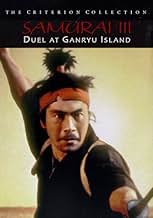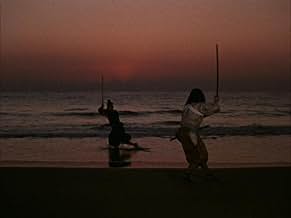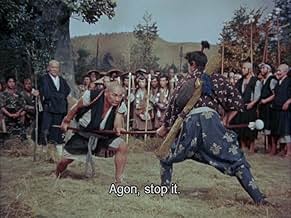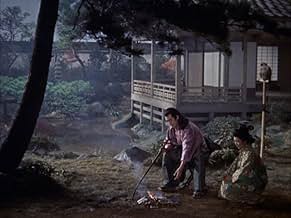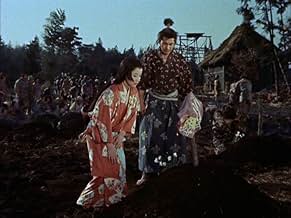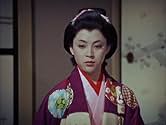CALIFICACIÓN DE IMDb
7.5/10
7 k
TU CALIFICACIÓN
Agrega una trama en tu idiomaMusashi Miyamoto is challenged to a duel by a confident swordsman Sasaki Kojiro. He agrees to fight him in a year's time.Musashi Miyamoto is challenged to a duel by a confident swordsman Sasaki Kojiro. He agrees to fight him in a year's time.Musashi Miyamoto is challenged to a duel by a confident swordsman Sasaki Kojiro. He agrees to fight him in a year's time.
- Dirección
- Guionistas
- Elenco
Opiniones destacadas
Samurai III: Duel on Ganryu Island is the closing film of Inagaki's Samurai trilogy, the story of Musashi Miyamoto (Mifune). It is one of the best samurai films on its own and has the advantage of having the characters' history established in the first two films of the trilogy. This film abounds in good characters: Musashi's two disciples, a young boy and a horse trader, who exchange good natured barbs and loyally support Musashi; the two women in Musashi's life, good girl Otsu and bad girl Akemi; the brigand leader and his henchman, who was formerly Akemi's stepfather; and of course, Musashi's nemesis, Kojiro Sasaki, who is outstanding in both this film and Samurai II. Kojiro is actually a more interesting character than Musashi and reminds me of Tatsuya Nakadai's performance in Sword of Doom. The climactic duel on the beach with the rising sun in the background is amazing. Side note: This film has four of Kurosawa's Seven Samurai actors: Mifune, Shimura, Kato and Chiaki. See the whole trilogy.
I feel very confident and content once I finished watching the trilogy. What starts of a nothing end on greatness. Lots of things have been said in the movie about the humans, the way they live, they behave, they treat others and above all their desires grooved in the very depth of the heart. What is most likable is the mildness with which things are being said but every bit needs to be heard with full attention. After watching the trilogy I read the book written by Miyamoto (A book of five rings Must read) himself and got an inside more clearly.
Now the movies, all three are gems without a second thought. The acting, cinematography and above all the direction is very good. Emphasis on little things, shades of lights (sun is setting etc) and even water (streams, rivers) everything is perfectly matched with the movie to the core. Above all is the way Mifune enacted the role, the way he delivers the expressions for an arrogant in the first outing, then the confused man and in the last gentle, kind and wise person is extremely believable and I have no doubt in saying that I can't imagine someone else in the role.
A must watch trilogy.
8.5/10 (all three movies)
Now the movies, all three are gems without a second thought. The acting, cinematography and above all the direction is very good. Emphasis on little things, shades of lights (sun is setting etc) and even water (streams, rivers) everything is perfectly matched with the movie to the core. Above all is the way Mifune enacted the role, the way he delivers the expressions for an arrogant in the first outing, then the confused man and in the last gentle, kind and wise person is extremely believable and I have no doubt in saying that I can't imagine someone else in the role.
A must watch trilogy.
8.5/10 (all three movies)
1st watched 4/19/2003 - 7 out of 10(Dir-Hiroshi Inagaki): Sweeping romantic Hollywood-like epic from Japan that just happens to be about a Samurai. This is the last in a trilogy of films about Mr. Musashi(played by Toshiru Mifune) and his Samurai journeys. This one plays more like a romantic piece with two women fighting(bawling & brawling) over the affections of this strong-willed but soft-hearted hero and brave warrior. It's awesome to see a film made in Japan where the warrior hero cares about more than killing his opponent. The obvious issue of honor is foremost in this Samurai's mind and the killing just comes with the job. So many films that Americans were introduced to from Japan were either silly Godzilla-type movies or karate flicks(with almost no heart, but a lot of fighting). This is the kind of movie that Japan is probably very proud of, but is not often seen by American audiences. Bravo to Criterion for putting this into their DVD collection!! Now I'd just like to see the 1st two pictures in the trilogy to know more about what happened to the characters prior to this film. The climatic duel is also `one-of-a-kind' and has to be seen to be appreciated. I'll just leave it at that without giving too much away. Give this one a shot, you'll be glad you did!
This was, by far the best of the trilogy and a fine ending. It had less Samurai action that the other two, but it was much more inspiring.
Kojiro (Koji Tsuruta) thought himself the best in the land and sought a duel with Musashi (Toshirô Mifune). But Musashi wanted to devote his life to becoming a better person. he went back to the land that he rejected and became a farmer.
In the meantime, both Otsu (Kaoru Yachigusa) and Akemi (Mariko Okada) managed to find him. Can you imagine that scene? Feeling rejected, Akemi is made to betray Musashi to the brigands. The effort fails and Musashi accepts the duel with Kojiro.
The duel itself was magnificent but short. It was a fitting end to a film that featured outstanding cinematography and a compelling story of the drive to perfection.
Kojiro (Koji Tsuruta) thought himself the best in the land and sought a duel with Musashi (Toshirô Mifune). But Musashi wanted to devote his life to becoming a better person. he went back to the land that he rejected and became a farmer.
In the meantime, both Otsu (Kaoru Yachigusa) and Akemi (Mariko Okada) managed to find him. Can you imagine that scene? Feeling rejected, Akemi is made to betray Musashi to the brigands. The effort fails and Musashi accepts the duel with Kojiro.
The duel itself was magnificent but short. It was a fitting end to a film that featured outstanding cinematography and a compelling story of the drive to perfection.
"In the old days, I used to hate farm work. I was always daydreaming, longing for victory and renown. I could think of nothing else. Now I'm tilling the fields again. Isn't it strange? I'm beginning to learn the value of life."
In this film's opening scene, we see Sasaki Kojiro (Koji Tsuruta) tell his lover (Michiko Saga) that he must fight Miyamoto Musashi for no other reason than the two of them are the best samurai in Japan. They're in a beautiful place with waterfalls streaming down and a rainbow arcing gracefully overhead as he calmly states his purpose, something which immediately begs the question, why? He is in an Eden of sorts, and yet feels compelled to fight an honorable man, unprovoked, to death.
Meanwhile we see the spiritual growth of Musashi (Toshiro Mifune) in the very next scene, when he's willing to humble himself and apologize for an offense the boy who's travelling with him has committed. He consistently makes decisions to avoid battle if at all possible, even if the other guy has it coming to him. We see it here, the first time when Sasaki catches up with him in a cemetery, and when he simply shows an ornery guy his fly catching prowess with his chopsticks to let him draw his own conclusions about continuing to provoke him.
The two of these great samurai (who were indeed real 17th century historical figures) are destined to fight one another, though Musashi puts Kojiro off for year, delaying the inevitable. Does director Hiroshi Inagaki effectively fill in the time it takes to get to the titular battle over the film's 105 minutes? Somewhat. There are bandits who must be fought off, and then there are the love interests. Both Otsu (Kaoru Yachigusa) and Akemi (Mariko Okada) are still carrying a torch for Musashi, and arrive in the rural area where he's taken up the simple life of farming. Personally I thought Akemi's character, the fallen woman who men have "made a plaything of," was muddled and added unnecessary melodrama. I think the film would have been stronger had she not been present, or shown instead fading into the ignominy of prostitution. Regardless, this third and last film in the trilogy suffers from some of the same problems its predecessors did, with the two women throwing themselves at his feet in what started to feel like filler until we got to the final battle (though I did like the resolution for Otsu).
The film is visually quite beautiful, with shots in a cemetery, reflections in the water, and walking past Mt. Fuji coming to mind. The poetry and precision of both lead actors striking samurai poses and movements should also be in that list, and nowhere is it done better than in their final battle, which brought the film full circle back to its beginning. There is something symbolic in this fight taking place out on the beach at sunset as the timeless waves gently roll in, oblivious to the human drama. Musashi recognizes it, and it's why he weeps. He weeps for the pointlessness of it, he weeps for mankind's insatiable urge to dominate or kill when it isn't necessary. His spiritual journey is complete, and he'll go back to Otsu and farming, not looking for trouble as he did so brashly at the beginning of the first film. He's enlightened, but how can we hope for humanity when there will always be another Kojiro?
In this film's opening scene, we see Sasaki Kojiro (Koji Tsuruta) tell his lover (Michiko Saga) that he must fight Miyamoto Musashi for no other reason than the two of them are the best samurai in Japan. They're in a beautiful place with waterfalls streaming down and a rainbow arcing gracefully overhead as he calmly states his purpose, something which immediately begs the question, why? He is in an Eden of sorts, and yet feels compelled to fight an honorable man, unprovoked, to death.
Meanwhile we see the spiritual growth of Musashi (Toshiro Mifune) in the very next scene, when he's willing to humble himself and apologize for an offense the boy who's travelling with him has committed. He consistently makes decisions to avoid battle if at all possible, even if the other guy has it coming to him. We see it here, the first time when Sasaki catches up with him in a cemetery, and when he simply shows an ornery guy his fly catching prowess with his chopsticks to let him draw his own conclusions about continuing to provoke him.
The two of these great samurai (who were indeed real 17th century historical figures) are destined to fight one another, though Musashi puts Kojiro off for year, delaying the inevitable. Does director Hiroshi Inagaki effectively fill in the time it takes to get to the titular battle over the film's 105 minutes? Somewhat. There are bandits who must be fought off, and then there are the love interests. Both Otsu (Kaoru Yachigusa) and Akemi (Mariko Okada) are still carrying a torch for Musashi, and arrive in the rural area where he's taken up the simple life of farming. Personally I thought Akemi's character, the fallen woman who men have "made a plaything of," was muddled and added unnecessary melodrama. I think the film would have been stronger had she not been present, or shown instead fading into the ignominy of prostitution. Regardless, this third and last film in the trilogy suffers from some of the same problems its predecessors did, with the two women throwing themselves at his feet in what started to feel like filler until we got to the final battle (though I did like the resolution for Otsu).
The film is visually quite beautiful, with shots in a cemetery, reflections in the water, and walking past Mt. Fuji coming to mind. The poetry and precision of both lead actors striking samurai poses and movements should also be in that list, and nowhere is it done better than in their final battle, which brought the film full circle back to its beginning. There is something symbolic in this fight taking place out on the beach at sunset as the timeless waves gently roll in, oblivious to the human drama. Musashi recognizes it, and it's why he weeps. He weeps for the pointlessness of it, he weeps for mankind's insatiable urge to dominate or kill when it isn't necessary. His spiritual journey is complete, and he'll go back to Otsu and farming, not looking for trouble as he did so brashly at the beginning of the first film. He's enlightened, but how can we hope for humanity when there will always be another Kojiro?
¿Sabías que…?
- TriviaThis film is part of the Criterion Collection, spine #16.
- ErroresAs the final duel is fought, the duelists have light on the sides of their bodies away from the sun - Sasaki has light on his back and Miyamoto light on his face.
- Citas
Musashi Miyamoto: Brace up, Akemi.
- ConexionesFeatured in Sayonara Jupitâ (1984)
Selecciones populares
Inicia sesión para calificar y agrega a la lista de videos para obtener recomendaciones personalizadas
- How long is Samurai III: Duel at Ganryu Island?Con tecnología de Alexa
Detalles
- Fecha de lanzamiento
- País de origen
- Idioma
- También se conoce como
- Samurai III: Duel at Ganryu Island
- Locaciones de filmación
- Productora
- Ver más créditos de la compañía en IMDbPro
- Tiempo de ejecución1 hora 45 minutos
- Mezcla de sonido
- Relación de aspecto
- 1.37 : 1
Contribuir a esta página
Sugiere una edición o agrega el contenido que falta

Principales brechas de datos
By what name was Miyamoto Musashi kanketsu-hen: Kettô Ganryû-jima (1956) officially released in India in English?
Responda

